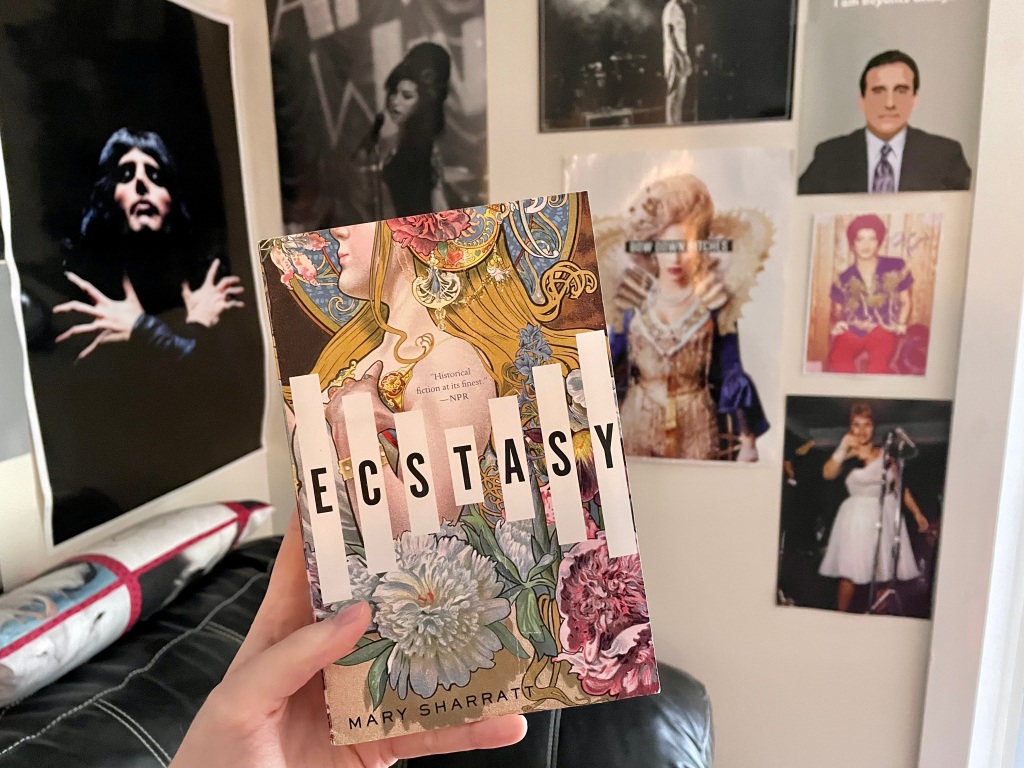Ecstasy by Mary Sharratt
Rating: ⭐️⭐️⭐️⭐️⭐️/5
Alma Schindler was considered the most beautiful woman in Vienna before marriage. She lit up a room the minute she strolled in and enchanted every man that came across her. But she was not only a socialite. Alma was an ambitious and creative young woman who strove to make a name for herself as a composer. Her talent, drive, and beauty are probably what led to the men in her life falling in love with her. The most famous of her lovers was the great composer and conductor Gustav Mahler, whom she would marry at 22.
Mary Sharratt’s Ecstasy explored the life of Alma Mahler, née Schindler; from her sexual awakening at the young age of 19 to her first husband, Gustav Mahler’s death when she was 32. As a young woman living in a society full of artists, architects, and the intelligentsia, Alma, as a character, was raised believing that she could take her love for music and create a life for herself independent of a man. But as she experienced the first hint of sexual desire at 19 years old, Alma found that there was a whole other aspect of life she wanted to explore: love and lust.
As a character, Alma is impossibly complicated, and Sharratt displayed this perfectly by representing the two warring sides of Alma as the demure and obedient Eve and the defiant and carnal Lilith. In the novel, it seems Alma was constantly fighting herself. Even before she was married, the need to compose and live her life to the fullest as a New Woman of the early 1900s was challenged by the worry of being considered the “third sex” or alien compared to traditional women. Once Alma was married to Mahler, that internal war only grew more violent as she became a mother and was constrained to the ideas of what Mahler thought a wife should be. Sharratt’s narration of Alma’s inner turmoil as a woman drowning in her husband and European society’s views of a woman’s place in the world left me, as the reader, desperate for Alma’s musical survival.
Alma’s sheer passion for music was what I treasured most as I read Ecstasy. Any music lover would feel a particular connection to Sharratt’s account of Alma’s total enraptured state after hearing a dazzling piece of music. Sharratt’s effort in describing the music Alma heard made it easy to feel how significant music was in Alma’s life. To see Mahler force Alma to stop composing and focus on supporting his music was hard to read after seeing Alma’s clear adoration for listening and composing music. I was in a state of despair as, chapter after chapter Alma sank deeper and deeper into her own depression because of her husband’s selfishness. That despair turned into elation as Mahler finally saw that he was hurting his precious Almschi and started promoting her compositions. The reawakening of Alma as a composer was wonderful to read after worrying that side of her was lost forever.
The title of Ecstasy not only hinted at Alma’s passion for music but also her passion for the physical pleasures of life. From the very first chapters, Sharratt narrates a young woman’s journey experiencing the bliss and enveloping hunger for physical expressions of love for the very first time. Alma’s carnal desires were an important part of expressing her love for the men in her life in the novel. Sharratt explored a woman’s desires that society would have frowned upon by society in the 1900s and embraced the idea of women having just as much sexual freedom as men.
The final battle between Alma’s two beings inside of her, Eve and Lilith, was one of the best moments for me. Finally, Alma let all her pain out on Mahler and allowed the fierce Lilith to spring free. The absolute freedom of body, mind, and soul Alma experienced was gratifying in every sense of the word. This is what Ecstasy is all about. The ruthless war and final triumph of a woman finding her place in the world.
I would recommend this historical fiction gem to all that have a deep love for music and wants to learn about the meaning of being a woman in the early 1900s.












